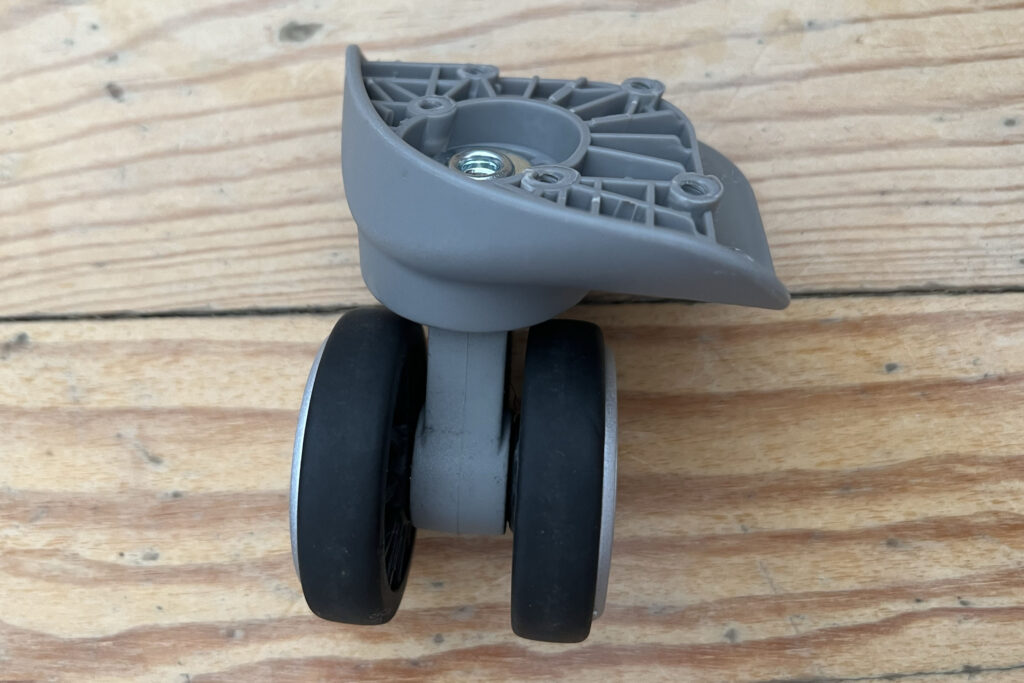 Miradouro da Grota do Inferno on São Miguel island in the Azores, Portugal.
Miradouro da Grota do Inferno on São Miguel island in the Azores, Portugal.
[I’m back after a summer break—my blog was cloned by a scammer in late June so I was trying to get that resolved before I started posted again.]
2023 has been the year of luggage woes for me. After more than two decades of travel, my luggage was lost for the first time. I knew my time was coming. (It inspired me to write a post about what to do if your checked baggage is lost so you can benefit from my misfortune.) The first time my luggage was just left in Dallas overnight on my way back from Asia in March and arrived the next morning—the best-case scenario.
Fast forward to July in Europe – London Heathrow had a massive malfunction with their Terminal 5 luggage sorting system, and my bag got stranded. I arrived in Lisbon for a short two-night stint before my flight to the Azores for a seven-day hiking trip. Of course, ALL of my hiking gear is in my checked bag – hiking boots, hat, camelback, etc.
Before I dig into the details of my luggage fiasco, I wanted so share some tips to help you in a similar situation:
What to do is your checked luggage is lost or delayed
- Always use an AirTag to track your bag. I recommend putting an AirTag in every checked bag and I even keep them in my carry-on bag with my camera gear. Buy a four-pack of AirTags for discount pricing! (affiliate link)
- Always keep your baggage tag receipt. Even better, take a photo of it when you check-in.
- File a report directly at the airport. It complicates things tremendously if you try to file one after leaving the airport. You’ll be given a reference number for tracking that you’ll need to keep.
- Keep all receipts for any toiletries or clothing purchased. Don’t go overboard with purchases. There is often a daily dollar or item limit for what you can claim.
- Call the airline if the status of your missing bag isn’t updated online. I did this to clarify I couldn’t pick up my bag in Lisbon for a week so they didn’t think it was abandoned.
- Get written proof that you picked up your bag. You’ll often need this to file for reimbursement, especially with credit cards that pay a daily amount for expenses. (Chase pays $100/day per person for a max of $500.)
Now, back to my luggage fiasco….
An airline representative was passing out papers with QR codes linking to the missing baggage form when we arrived, which I filled out instantly. I selected that I’d pick it up at the Lisbon airport. Since I was island-hoping in the Azores, it seemed too complicated to get it sent there. Plus, British Airways doesn’t fly there. (Luckily, I did have a few pieces of clothing in my carry-on. I try to always have a change of clothes but airlines have gotten stolen strict on carry-on bag weight that I normally just have only my camera gear in my carry-on.) I bought a few toiletries, pieces of clothing and borrowed a pair of hiking boots from a friend. While airlines are supposed to provide reimbursement for clothing and toiletries, I didn’t go crazy with buying things because I wasn’t sure how much of a hassle it would be to get reimbursed.
Thankfully, I had an AirTag in my bag, so it was easy to track. British Airways’ antiquated system didn’t update for days–it said it was trying to locate my bag when it was already in Lisbon per my AirTag. Of course, it made it to Lisbon five hours after I left for the Azores!
When I flew back to Lisbon after my Azores trip, I picked my luggage up at the airport, which was another fun venture with a grumpy staff member of a third-party service. I made sure to get proof that I picked up my bag to use for my reimbursement claim. Afterward, I went online to file for reimbursement for the things I bought. The form was very tedious because every item must be listed individually.
After a month with no response, I followed up with the airline and decided to go ahead and file a claim with my credit card since it didn’t seem like British Airways was going to reimburse me. I bought the flight with my Chase Sapphire Reserve card, so I filed a claim through their system, which is operated by a third party (eclaimsline.com). The website was tricky and had trouble loading. I tried three different web browsers across multiple days before finally getting it to load for me to fill out another tedious form where I had to itemize everything and convert the currency to USD. Every airline in the world was listed in the dropdown menu except British Airways so the form kept giving me an error at first before I finally found an “other airline” option buried in the list. I had to include the claim number I’d filed with British Airways, upload proof my luggage was delayed, receipts of the items I purchased, my credit card statement proving I’d bought the ticket with my Chase card, proof I’d gotten my luggage back, etc. Both this form and my British Airways form asked for direct deposit for my bank account. This Chase benefit has a limit of $100/day per person with a $500 limit and was very specific about how many electronics chargers (one per device) they would cover.
Naturally, two days after I did this, British Airways responded with an apology and said they’d deposit the reimbursement soon, which they did in two days for $73. Of course, I heard back from my credit card claim right after that, and they also said they were reimbursing me, but nothing has been direct deposited. I possibly might get double paid for the claim, which honestly just makes up for the time it took to fill out the forms and find all the required documents! After reading this story from The Points Guy, I didn’t have high hopes for my Chase claim but was very surprised I at least got a response so quickly. I’d had a good experience with them paying for a canceled trip in 2019, which I wrote about in this blog post here.
(I also had travel insurance. If the airline or my credit card had not paid, then I would have filed with them. I pay a high annual fee for my credit card so that’s why I filed with them instead of my travel insurance first.)
Does travel insurance cover lost checked luggage?
It depends on the policy and the brand. I recommend Safety Wing Nomad Insurance. Their plans cover lost luggage and pay up to $500 per item, which is not subject to the plan’s $250 deductible. Safety Wing’s travel medical insurance policies cover people (including children) all over the world even when they are outside their home country. Other benefits include travel delay, emergency response, natural disasters and personal liability. Currently, I always use Safety Wing for my travel insurance because it just makes it easier for me to travel to the world knowing I can get coverage anywhere and at anytime. For more about travel insurance, check out this post.
Broken Suitcases & Suitcase Warranties
 My brand new suitcase was missing a wheel after a SAS Airlines flight in Europe.
My brand new suitcase was missing a wheel after a SAS Airlines flight in Europe.
While I’d been lucky to not be cursed with lost luggage until this year, I’ve been plagued with broken suitcases for years. There was the time that early 20s Anna thought it would be smart to slide her suitcase down a staircase to avoid carrying it. The zipper on the front pocket of the soft-sided suitcase popped off. I was broke so I just duct taped the suitcase shut for the next two months of my trip.
Then, I was cursed with broken wheels – often caused by sketchy sidewalks. In 2019, I went through three suitcases in six months. When one would break in the middle of a multi-month trip, I’d buy a new one wherever I was. The new one was often subpar to the one of broken and made me realize that I just needed to suffer with the broken one.
 Suitcase wheels that have dual wheels on each individual wheel are stronger and more durable than single wheels. (This is a photo of the replacement parts Samsonite sent me to repair my broken wheel that the airline had ripped off.)
Suitcase wheels that have dual wheels on each individual wheel are stronger and more durable than single wheels. (This is a photo of the replacement parts Samsonite sent me to repair my broken wheel that the airline had ripped off.)
TIP: Always buy a spinner suitcase with wheels that have two wheels per wheel. They are much sturdier and last longer.
Suitcase warranties have been mostly worthless to me because it’s not a quick fix when I’m in the middle of a multiple-month trip. Suitcase companies often want you to take it to an inconveniently located repair center or deal with lengthy paperwork.
When I flew from Athens to Copenhagen in June on SAS Airlines (good airline aside from luggage drama), my suitcase arrived missing the back left wheel. I had literally just bought the suitcase in April at the Samsonite outlet in Texas for $180.
I filed a claim with the airline, which was a tedious two-step process that yielded no results. Since I could still roll the suitcase if I did it a certain way, I just dealt with it and researched all public transport to ensure there were elevators.
After emailing Samsonite directly twice and never getting a response, I called a Samsonite repair center in San Antonio to ask if they sold extra wheels. The friendly guy on the phone asked me to email photos because the numbers on the suitcase tags were worthless. He had the wheels in stock and shipped them to a friend who was meeting me in Lisbon. Without even asking for proof of purchase, he sent the wheels for free to my friend! When I got my suitcase back, I was able to swap out the wheel with a screwdriver – very simple! Moral of the story: Call a repair center directly for parts instead of going through company website.
Are expensive suitcases like Away worth the price?
It depends on where you live, how often you travel and how long you travel. For example, Away’s website says it will provide a replacement kit under their lifetime warranty but likely will only ship to the US or UK, which are the only places it ships its products. For the average person going on short trips with a homebase in one of those countries, then it would possibly be worth it. I have friends who swear by Away bags. If Away sent me a free bag, I’d be willing to try it but just can’t justify the cost since I’m abroad too frequently for long periods. Plus, I have a Target brand carry-on suitcase that was a $100 last-minute purchase that’s been going strong for two years. I’ve never wanted to spend a lot on fancy luggage because I’m often abroad for months making it hard to get it repaired or get spare parts. That’s why I can’t justify the cost.
[AFFILIATE DISCLOSURE:Please note that some affiliate links are used in this post. If you make a purchase, I earn a small commission at no cost to you, which goes toward the cost of maintaining this blog. If you would like to support this blog and are ready to make a purchase, these links are one way to show your support. I only recommend products and companies I truly love and use. To show your support for the blog, check out the resources page.]

